|
Sunday, August 28th, 2016
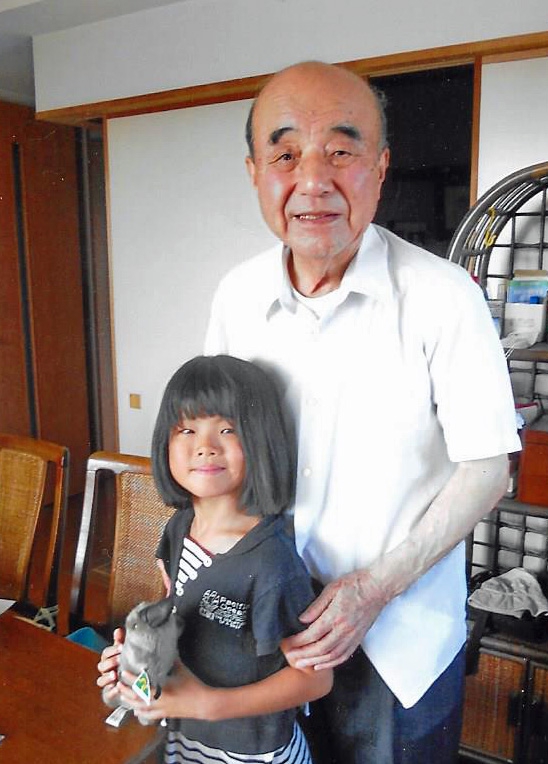
Mr. Torao Tomita, Professor Emeritus of St. Paul’s University in Tokyo and Chairman of Friends of MacDonald Japan, passed away on June 11, 2016 at the age of 87. Prof. Tomita came across Ranald MacDonald in 1969 when he attended the live play “Grassroots Warriors” performed by the Bunka-za Theater Group. Tomita-san was quite intrigued when one of the actors – portraying an American Indian named Ranald MacDonald – proclaimed that “in America, the People are more important than the President”. Based on this single statement, Mr. Tomita began doing his own research into the man Ranald MacDonald, reading everything he could find, including the Narrative written by MacDonald and visiting as many of the places MacDonald had mentioned, both in Japan and in America. In 1979 Tomita translated Ranald’s Narrative into Japanese, and published his own revision in 1981 and again in 2012. Eventually, as his research continued, Mr. Tomita revised his original portrayal of Ranald MacDonald from a youth who seemed a rather “reckless adventurer” into a rational, deliberate and thoughtful adventurer.
Posted in FOM Japan, Gates Ajar, Home | Comments Off on A Tribute to FOM-Japan ‘Founder’, Torao Tomita
Saturday, August 27th, 2016
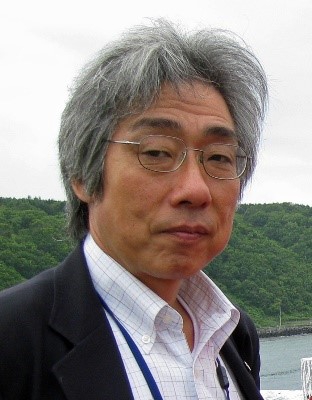 「マクドナルド上陸記念碑の建立を祝ってラナルド・マクドナルド利尻島上陸記念碑の建立に際し、私ども日本マクドナルド友の会から、心からお祝いを申し上げます。野塚岬の丘の上に立つと、はるか150年も昔、マクドナルドが草履をはき、二人のアイヌに手を引かれて、おぼつかない足どりで浜辺から上がってくる姿が眼に浮かびます。厳しい鎖国令下にある日本に潜入するため、慎重で大胆な冒険家マクドナルドが選んだ戦略は偽装漂流と、島の人びとの温情にすがることでありました。それは美事に成功し、野塚の番小屋では、タンガロと誤記された番人多治郎との暖かい友情まで生まれました。同じ平地に立って一対一で対等に向き合えば、いつの時代でも、どこででも、暖かい人間同士の交流が成立するのだ、という事をマクドナルドは身をもって示してくれたのです。10年ばかり前に、アメリカ側にフレンズ・オブ・マクドナルドが結成され、アストリアの丘の中腹にある生誕地に、マクドナルド顕彰碑が建立されました。ここ野塚の上陸記念碑とアストリアの顕彰碑は、太平洋を挟んではるかに向き合い、初めは言葉も分からない人間同士が、相互に相手を信頼し合えば、深い友情の絆で結ばれうるという事を、訪れる人びとに語り続ける事でありましょう。ひと言つけ加えたいと思います。それは、この記念碑の建立を誰にもまして悦んで下さるはずの二人の方を、最近相ついで失ってしまった事です。一人はフレンズ・オブ・マクドナルドの会長冨田正勝氏であり、もう一人は日本マクドナルド友の会の発展に尽くされた高橋正樹氏であります。お二人の御冥福を祈りたいと思います。1996年10月23日 日本マクドナルド友の会 富田虎男」 「マクドナルド上陸記念碑の建立を祝ってラナルド・マクドナルド利尻島上陸記念碑の建立に際し、私ども日本マクドナルド友の会から、心からお祝いを申し上げます。野塚岬の丘の上に立つと、はるか150年も昔、マクドナルドが草履をはき、二人のアイヌに手を引かれて、おぼつかない足どりで浜辺から上がってくる姿が眼に浮かびます。厳しい鎖国令下にある日本に潜入するため、慎重で大胆な冒険家マクドナルドが選んだ戦略は偽装漂流と、島の人びとの温情にすがることでありました。それは美事に成功し、野塚の番小屋では、タンガロと誤記された番人多治郎との暖かい友情まで生まれました。同じ平地に立って一対一で対等に向き合えば、いつの時代でも、どこででも、暖かい人間同士の交流が成立するのだ、という事をマクドナルドは身をもって示してくれたのです。10年ばかり前に、アメリカ側にフレンズ・オブ・マクドナルドが結成され、アストリアの丘の中腹にある生誕地に、マクドナルド顕彰碑が建立されました。ここ野塚の上陸記念碑とアストリアの顕彰碑は、太平洋を挟んではるかに向き合い、初めは言葉も分からない人間同士が、相互に相手を信頼し合えば、深い友情の絆で結ばれうるという事を、訪れる人びとに語り続ける事でありましょう。ひと言つけ加えたいと思います。それは、この記念碑の建立を誰にもまして悦んで下さるはずの二人の方を、最近相ついで失ってしまった事です。一人はフレンズ・オブ・マクドナルドの会長冨田正勝氏であり、もう一人は日本マクドナルド友の会の発展に尽くされた高橋正樹氏であります。お二人の御冥福を祈りたいと思います。1996年10月23日 日本マクドナルド友の会 富田虎男」
今から20年前の1996年10月23日、利尻島野塚岬に建立されたマクドナルド顕彰碑・吉村昭文学碑除幕式の立教大学名誉教授富田虎男先生の祝文である。
マクドナルドの利尻島上陸に手を引いた二人のアイヌ人、上陸してから芽生えた番人多治郎との暖かい友情。マクドナルドの生誕地米国オレゴン州アストリアの丘の中腹と日本国利尻島野塚とに太平洋を挟んで向き合う二つの記念碑。富田虎男先生の祝文を今一度読み直した私は、マクドナルドと島人たちの出会いを過去、現代において建てられた記念碑は物として使うのではなく、人は心と心、物は物語として膨らませて現代に繋げ、未来の交流を創って行く事の大切さ強く感じた。このことから、アストリアに建つ顕彰碑の上の五角形はマクドナルドが生まれたアストリア、捕鯨船から離れて上陸した焼尻島、初めて人と出会った利尻島、オランダ通詞たちに英語を教えた長崎、墓のあるトロダの五ヶ所を表していることになると思った。
病気療養中の富田虎男先生は2016年6月11日の未明、87歳で永眠された。家族葬にて6月16日午後6時から通夜、翌17日午前11時半から告別式が埼玉県所沢市の所沢市斎場で行われた。葬儀会場で富田虎男先生の遺影写真を見ながら様々に思いが蘇ってきた。
富田虎男先生がマクドナルドに出会ったのは1969年の劇団文化座「草の根の志士たち」だったという。公演で「長崎にはアメリカのインディアンがいて、アメリカでは一番偉いのは人民、その次が大統領」という台詞から、マクドナルドの事を知った富田虎男先生は、マクドナルドに縁のある米国・日本各地を訪れ、マクドナルドの日本回想記に書かれている事柄を確認しながらマクドナルドを追い続けた。その成果を1979年に富田虎男訳訂『マクドナルド「日本回想記」-インディアンの見た幕末の日本』として発刊した。その後、1981年に補訂版、2012年に再訂版を出している。発刊後に得た新しい資料等を基にして書き換えてきた。再訂版には「鎖国の日本に潜入した命知らずの大胆不敵な冒険家というラナルドのイメージは消え失せ、大胆ではあるが用意周到な冒険家というイメージが私の中に浮かんできた」と書いている。
富田虎男先生のマクドナルド研究の視点から「日米民間交流の先駆者ラナルド・マクドナルド-鯨が開いた鎖国の扉-」として、マクドナルドの調査研究とまとめを引き継ぎたい。~ Eiji Nishiya, Rishiri Isl., FOM Japan
Posted in FOM Japan, Gates Ajar, Home | Comments Off on 富田虎男先生から受け継ぐマクドナルド~~利尻島 西谷榮治
Saturday, August 27th, 2016
The First Ranald Macdonald Prize to be awarded on October 11, 2016
Long ago, in 1993, I took a trip to Indonesia, and ever since then I have searched for some thread I could follow that connects Holland westward – not eastward – to the Far East. Fifteen years later I found this thread in Frederik Schodt’s biography of Ranald MacDonald. In 2008, my best friend Josje-Marie Vrolijk and I traveled westward around the world in the footsteps of Archibald McDonald and Ranald MacDonald. That was when we met you, the Friends of MacDonald. The trip was so inspiring that I became a very good friend of both Ranald and his modern friends.
My father died in 1999, and when my mother passed away in 2011 I decided to use the inheritance, earned by them in the private sector, for something useful in the public sector. That is how the idea for the Ranald MacDonald Award was conceived. But it needed some time to gestate. The name of the foundation, The Friends of MacDonald • The Dutch Connection, was inspired by a nickname Bruce Berney kindly gave Josje and me during our 2008 trip, and the foundation itself was formally established on November 12, 2015. It would not have been possible without a little help from my friends, actually without much help, from many friends, including you. And I am very grateful to all.
Frederik Schodt suggested having the award ceremony on October 11 of every year, in commemoration of that Wednesday in 1848, when Ranald MacDonald arrived in the bay of Nagasaki on the Tenjinmaru and was met by the Japanese government’s interpreter, Einosuke Moriyama, and the Dutch trading factor, Joseph H. Levyssohn. I was very happy with this idea, because this small meeting beautifully symbolizes the meeting of ‘the West’ coming from “the East”; the “East” in this case being on the spot in Nagasaki and ‘the West’ coming from the true west—a directional meeting that I have long been intrigued by, and which shall always be central in the works we are henceforth going to commemorate. So, in the official papers of FOM NL, as we have abbreviated the name, October 11 is now the official date for the award ceremony.
For details about the prize, please visit the website of the foundation and/or its Facebook page (see below). For a short explanation, the text on our business cards should suffice: “Friends of MacDonald • The Dutch Connection – a Cultural Public Benefit Organization which tries to advance insight in relations between Asia, Europe and North America. Its major activity is to grant the ‘Ranald MacDonald Prize’ to a young writer or artist whose work sheds new light on those relations. The prize amounts to 5000 Euros and will be announced every October 11.”
I suspect there is one thing readers of this description might consider odd: the award is Pan-Asian, Pan-European and Pan-North-American, which might seem to be too much to put on the shoulders of one individual like Ranald. But on the other hand, Ranald MacDonald w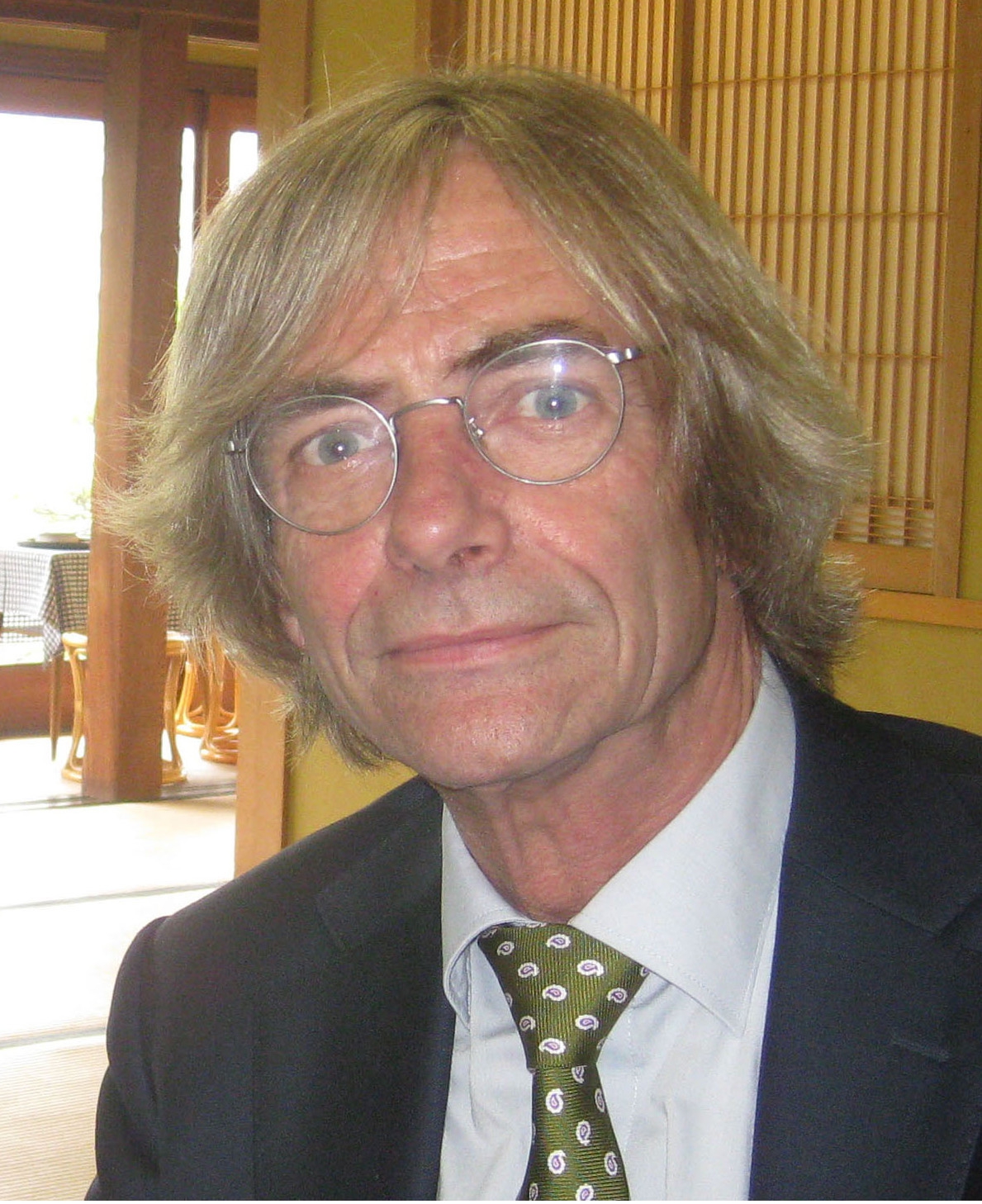 as very much like you and me, operating in a highly unbalanced world. And it seems to me that we are all living again in a highly unbalanced world. Just as Ranald MacDonald cannot be understood without understanding the world he lived in, so, too, are we unable to understand ourselves without understanding the world that surrounds us. FOM NL therefore seeks to recognize and encourage the work of people who can help us understand what is happening. I like to think that Ranald MacDonald would be very happy with our goal, and I hope you agree. as very much like you and me, operating in a highly unbalanced world. And it seems to me that we are all living again in a highly unbalanced world. Just as Ranald MacDonald cannot be understood without understanding the world he lived in, so, too, are we unable to understand ourselves without understanding the world that surrounds us. FOM NL therefore seeks to recognize and encourage the work of people who can help us understand what is happening. I like to think that Ranald MacDonald would be very happy with our goal, and I hope you agree.
As I write this, it is August 17, or “Hari Proklamasi” or Independence Day, in Indonesia, where I was born. At FOM NL we are now judging some fifty works of writers and artists from all over the Northern Hemisphere, and we are trying very hard to select just one. This is not easy, because, frankly, the applicants all really deserve the award. But in the process of deciding, the name of Ranald MacDonald will become better known in the Netherlands – and every year one modern individual will be very surprised to receive an award named after him. Is not that amazing?
Fred Dijs, Secretary, FOM • The Dutch Connection
Posted in FOM Japan, Gates Ajar, Home | Comments Off on FOM-NL “The Dutch Connection”
Tuesday, June 28th, 2016

Our largest group yet! A hearty “thank you” to those attending this years’ Friends of MacDonald Membership meeting! Especially wonderful was being able to host members of Clan Donald, North Pacific Region, Clan Donald USA, who delighted the rest of us with their colorful Tartans and splendid bagpipes! We also want to welcome and acknowledge Consul General Kojiro Uchiyama, the new head of the Consular Office of Japan in Portland, and his wife Karen, herself a native of Montana, Fr. Dale Johnson and Rev. Deacon George Konig of the Syriac Orthodox Church, who work with refugees in Turkey and Germany, Rex and Keiko Ziak of Astoria, representing the Obon Society, a Japanese-American NPO art history project dedicated to the documenting, exhibiting and return of personal artifacts and personal memorabilia taken as battlefield souvenirs during World War II, and Mr. Koichi Higuchi (who came all the way from Tokyo just to attend our meeting – Mr. Higuchi is kneeling next to our Chairman in the front row; both are wearing FOM t-shirts designed by Mr. Higuchi.)
Over the past year we have been able to introduce Friends of MacDonald to new and different groups. As you might remember, in July 2015 our Chairman gave a power point presentation to a group of 30 young English teachers who were taking part in Japan’s Ministry of Foreign Affairs program entitled “Japan-US Training and Exchange Program for English Language Teachers”. The presentation was a resounding success, so much so that Portland was again chosen to host another group in August 2016. This is significant since only three US cities are chosen to host each year. When these teachers go back to Japan and present what they have ‘learned’ during their time here in the US, they will spread the story of Ranald MacDonald to a new generation of students, aided by FOM’s gift of the book “Unsung Hero” (written by Atsumi Tsukimori of Spokane) that was presented to each of the participants last July (as will happen again this August). Also part of this year’s presentation will again be FOM’s “Storyteller Laureate”, Mr. Alton Takiyama Chung.
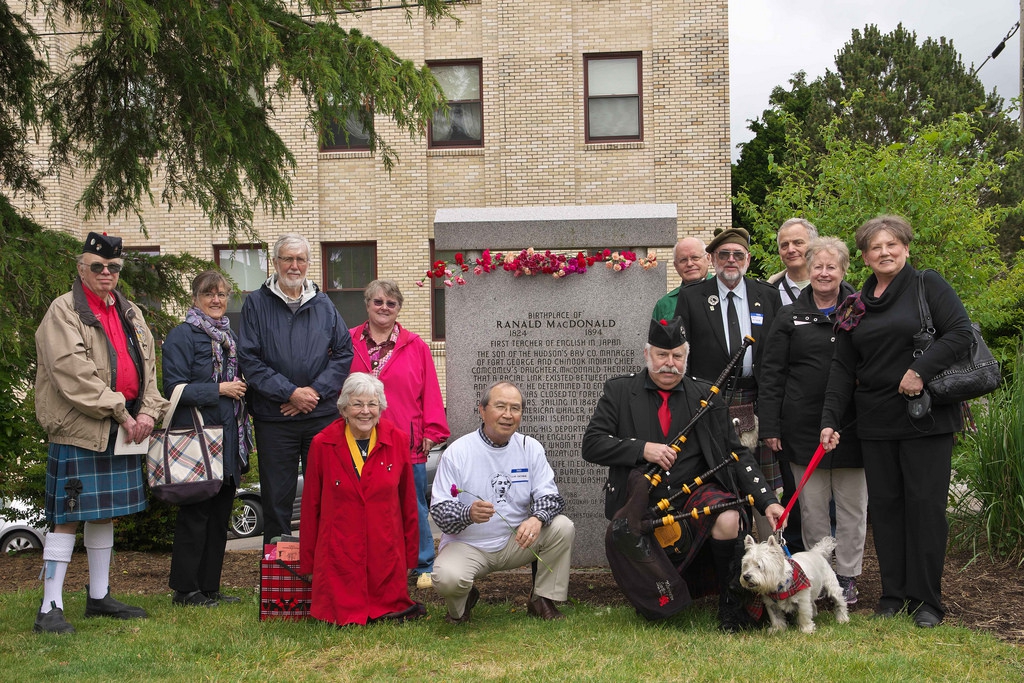
Members of Clan Donald pose with FOM Chairman Mas Yatabe in front of the MacDonald birthplace monument
Posted in Gates Ajar, Home | Comments Off on Our Largest Group Yet!
Sunday, March 27th, 2016
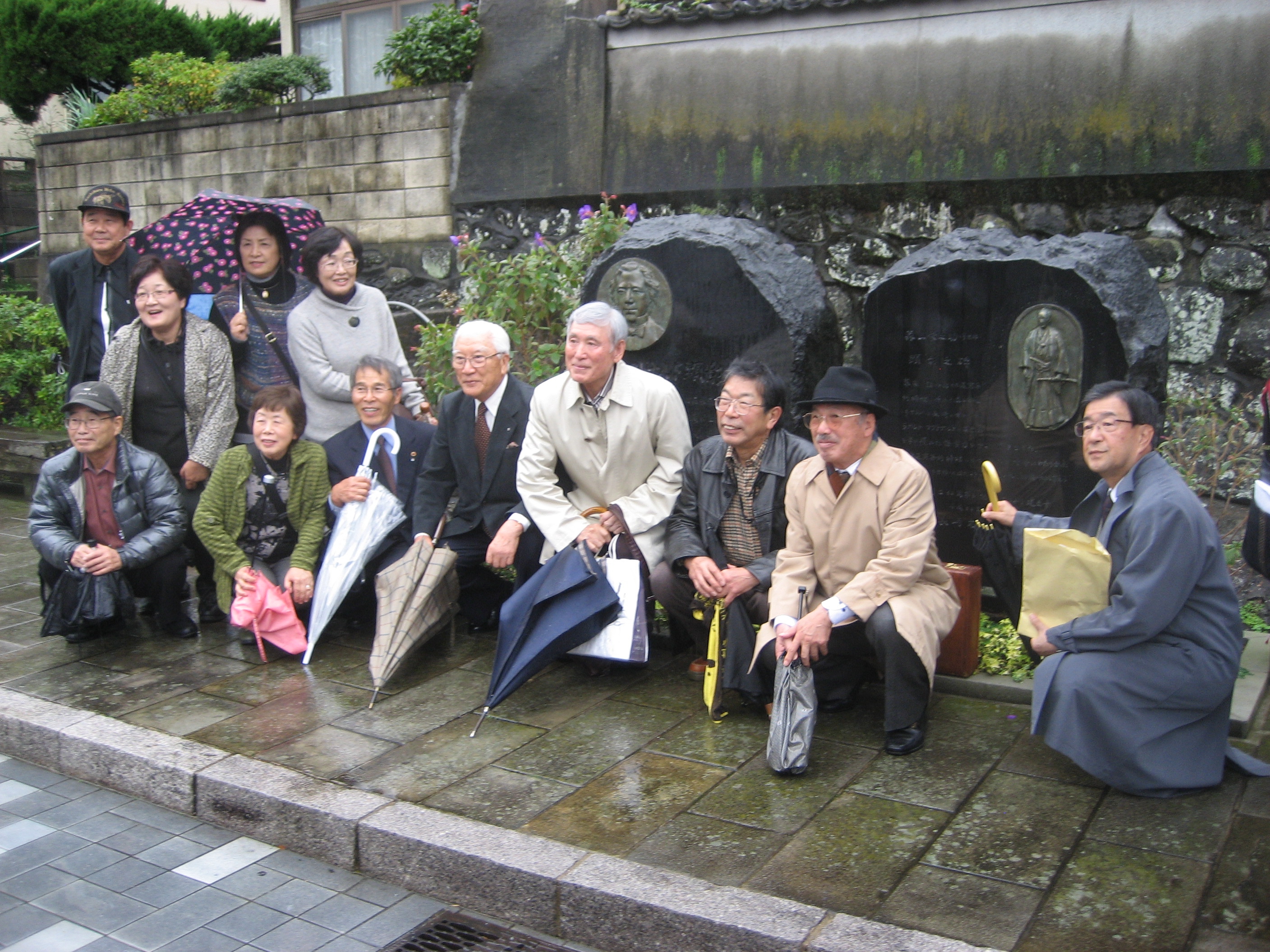
小濱正美医(マクドナルド友の会長崎代表)からのご報告によると、2015年12月10日に愛知県美浜町より41名の音吉顕彰会(齋藤宏一会長)の方々が訪長、マクドナルド友の会長崎及び長崎南ロータリークラブの方々と和やかに交流、友好・親睦の輪が出来上がったとの事でした。
According to Dr. Masami Obama of FOM Nagasaki, 41 members of Friends of Otokichi – led by its President Koichi Saito – came to Nagasaki and had a friendly exchange with FOM Nagasaki and Nagasaki-Minami Rotary Club members. Together, they visited Ranald MacDonald’s and Moriyama Einosuke’s monuments, both of which were erected by Nagasaki-Minami Rotary Club in 1995 and 2015 respectively.
Posted in FOM Japan, Gates Ajar, Home | Comments Off on News From FOM Nagasaki
Wednesday, February 25th, 2015
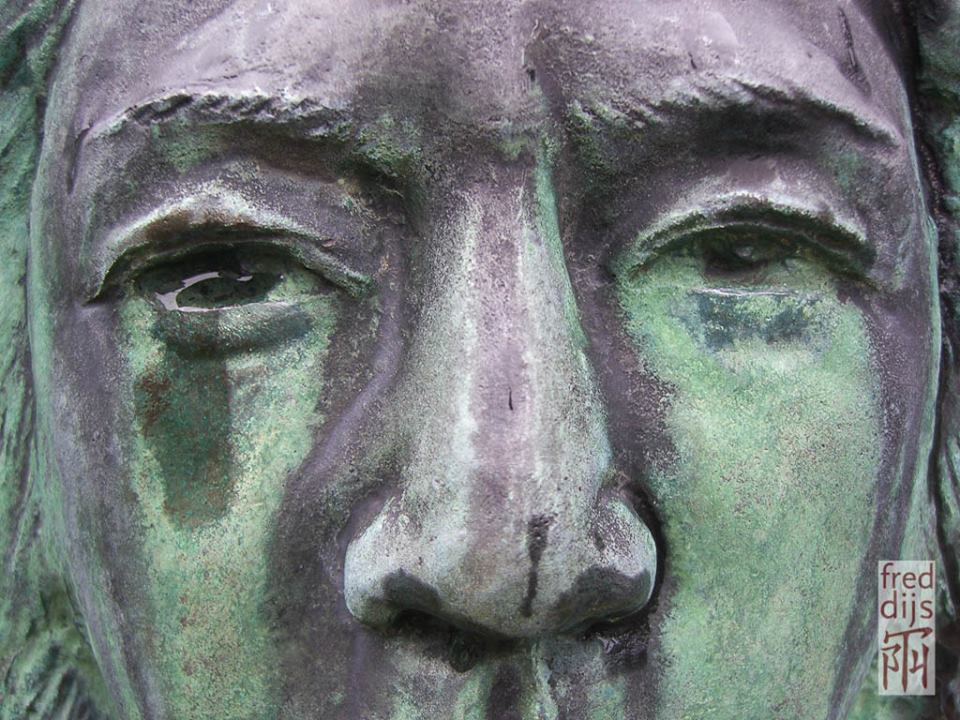
For the past 20 years, there stood a lonely monument of Japan’s very first “Native-Speaking English Teacher”, Ranald MacDonald, along Matsunomori Street of Kaminishiyama-cho in Nagasaki-City. It was erected in 1994 by the Nagasaki-Minami Rotary Club as part of their 30th Anniversary Project under then-President, Dr. Masami Obama.
Ranald MacDonald was captured as an illegal intruder on the shores of Rishiri Island in 1848; however, because of his good attitude and respectful behavior toward the Japanese people and its culture and traditions – unlike other foreign sailors who were washed ashore – he was “merely” placed under house arrest at Daihian.
At that time, the Tokugawa Shogunate was feeling the need for trained interpreters who could be effective in the English language rather than the traditional Dutch-oriented interpreters. The arrival of MacDonald, who had received a good education because of his Scottish father, Archibald MacDonald, was quite timely, and the Shogunate immediately arranged to use him as a temporary teacher of English, primarily for “conversation and pronunciation”.
The Dutch interpreters, 14 of them, commuted to Daihian for the next 7 months for Ranald’s English lessons till Ranald was forced to return to go back home. The leader and best student among the 14 was Einosuke Moriyama.
Several years later, when Commodore M. Perry of the US East Indies Squadron came to Japan to demand the Shogunate to open its door to America, Moriyama acted as a chief interpreter on behalf of the Shogunate. Subsequently, Moriyama worked hard to interpret and negotiate with the British, French, Russians, etc. Much praise of Moriyama’s language and negotiation skills were written in the records of foreign governments.
A monument dedicated to Einosuke Moriyama was (finally) dedicated on September 12, 2014 – it can be found along Matsunomori Street of Kaminishiyama-cho in Nagasaki-City, right next to the MacDonald Monument – and it is quite appropriate that the two monuments of MacDonald and Moriyama were erected side by side. Be quiet and listen! You might hear the exchange of laughter and conversation between the two. I am confident Ranald is no longer lonely there. ~ Mas Yatabe
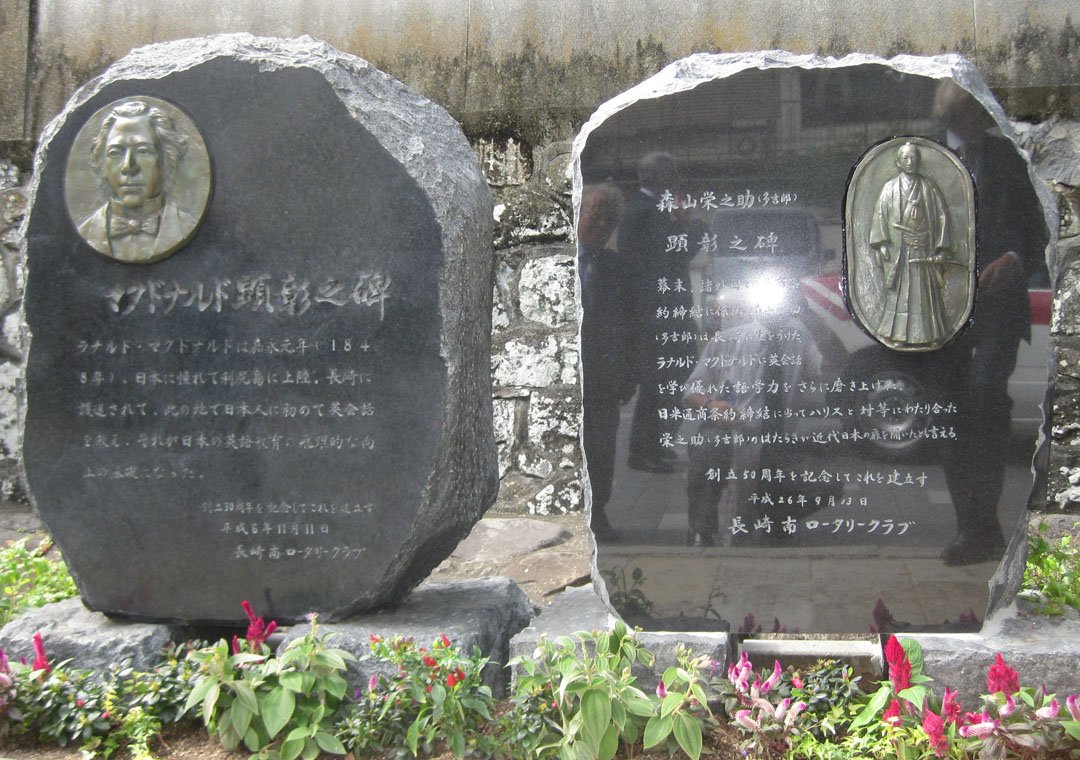
過去20年間に及び長崎市上西山町松の森通り沿いに「日本で最初の英語教師」として今日崇められているラナルド・マクドナルドの顕彰碑がひっそりと佇んでいた。それは長崎南ロータリークラブ(当時、小濱正美医会長)が1994年に同クラブ創立30周年記念事業として建立したものであった。
マクドナルドは1848年に“密入国者”として囚われの身になったが、他の外国人遭難船員等の違法入国者と異なり、日本人、日本文化に対する誠意ある尊敬の念と良好なる態度が長崎奉行により認められ松の森通り沿いに在った大悲庵と称する座敷牢に幽閉されたのであった。
時を同じくして幕府は当時従来のオランダ語中心の外国語通詞から、英語に長けた通詞養成の必要性を感じていた。そこにたまたま父親、アーチボルド・マクドナルドによりしっかりとした教育を身に付け、態度良好で英語を母国語としていたラナルド・マクドナルドの出現は、臨時英語教師として打って付けであった。よって出島のオランダ語通詞たち14人はマクドナルドから英語、主として英会話の指導を受けるため大悲庵に通い始めたのであった。マクドナルドを師とする英語のレッスンは、マクドナルドが強制送還されるまでの7ヶ月間続けられ、その14人の通詞たちのリーダーであり、最も優れた生徒が森山栄之助であった。
マクドナルドが去った数年後に徳川幕府に「開国」を迫ってやって来たペリー提督率いる米国東インド艦隊との交渉の際、幕府側の主席通訳として森山は大活躍した。その後、次々にやってきた英国、フランスやロシアとの通商条約締結の交渉に森山は徳川幕府にとり不可欠な存在となり、その事は特に外国の文献に森山の優れた語学力と交渉能力を称える記録が残っている。
今回、師弟関係にあったラナルド・マクドナルドと森山栄之助の顕彰碑が並列して建立された事は、実に喜ばしい! 耳を澄ますと、二つの碑の間で往時を偲ぶ会話と笑い声が交わされているのが聞こえてくるようにさえ感じられる。 察するに、今ではラナルドも寂しさから開放されたに違いない。- 谷田部 勝
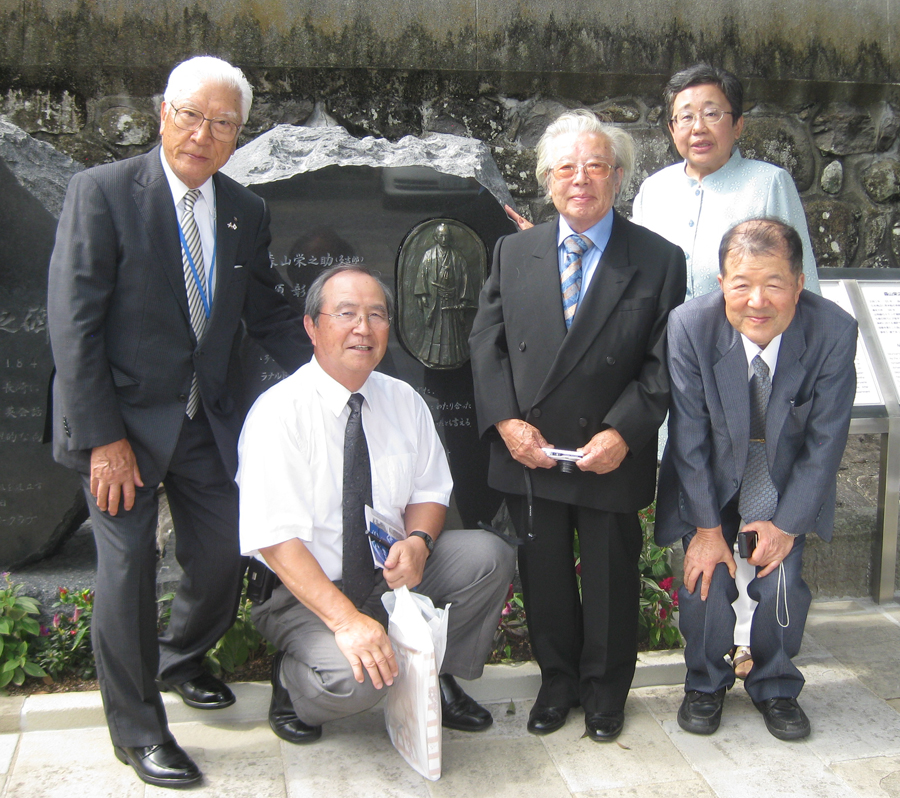
(from L to R) Dr. Masami Obama, Mas Yatabe, Kazukuni Yamazaki(Sculptor), Michi Goto, Yuji Aisaka 小濱正美医、谷田部 勝氏、山崎和國氏(彫刻家)、後藤 道女史、逢坂祐二氏
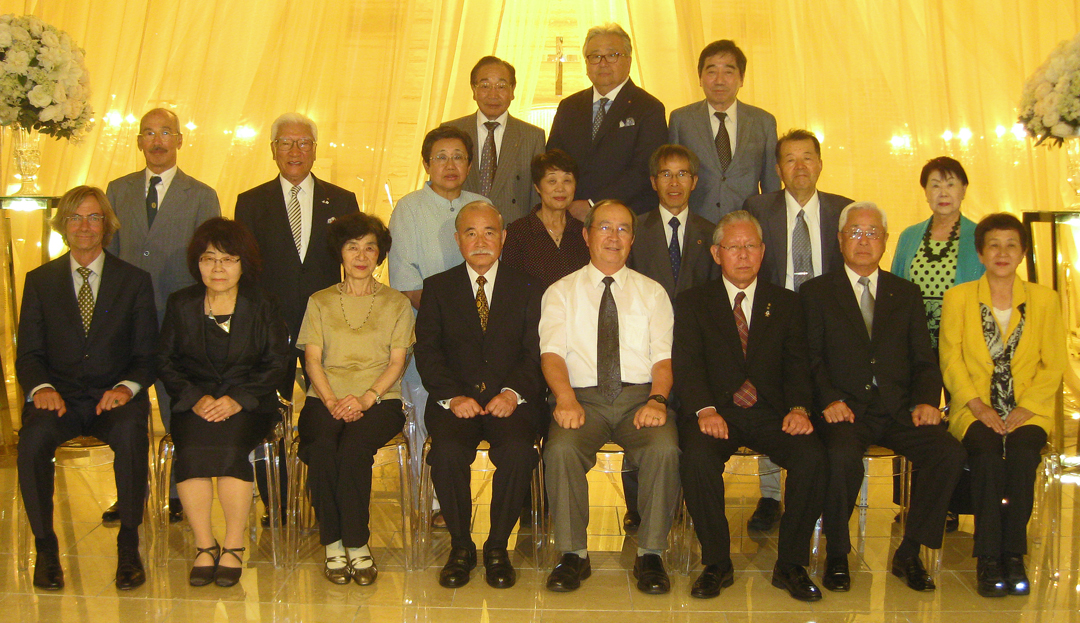
It was a gathering of FOM members from Hokkaido, Tokyo, Aichi, Kyoto, Osaka, Nagasaki and even Holland and the U.S.A. “It was fun and enjoyable – just like a class reunion,” per Ms. Yumiko Kawamoto. 記念撮影: 森山栄之助顕彰碑除幕記念晩餐会出席者一同 出席者は北海道、東京、愛知、京都、大阪、長崎、更に海外のオランダ、アメリカ・・・と「和やか、且つ楽しく同窓会みたい!」とは河元由美子女史の弁。
Save
Save
Posted in FOM Japan, Gates Ajar, Home, Uncategorized | Comments Off on Moriyama Monument Dedicated
Tuesday, November 25th, 2014
~Edward Stratton; Reprinted from The Daily Astorian, Oct. 17, 2014
The “MacDonald’s Encouragement Study Fund”, in honor of historical English teacher and former Astorian Ranald MacDonald, sent over, from left st anding, English instructor Mayumi Nakanishi and students Ren Miyashita and Takeru Oshima. Hosting and touring them around are Astoria High School student Bryce Nurding, second from right, Masaru Yatabe, Chairman of FOM, right, and Kaheawai “KK” Kaonohi, founder of the high school’s Japanese club. anding, English instructor Mayumi Nakanishi and students Ren Miyashita and Takeru Oshima. Hosting and touring them around are Astoria High School student Bryce Nurding, second from right, Masaru Yatabe, Chairman of FOM, right, and Kaheawai “KK” Kaonohi, founder of the high school’s Japanese club.
The educational exchange between Astoria and Japan, foisted on the Asian nation 166 years ago by a native Astorian bent on leaving his whaling vessel and joining its relatively closed society, restarted earlier this week.
Honoring the spirit of Ranald MacDonald, an Astoria native and Japan’s first English teacher, the ’MacDonald’s Encouragement Study Fund’ sent two students and their English teacher from Rishiri Island to Oregon this past week. The group has been sightseeing around Portland and shadowing their host students at Astoria High School.
“I like talking, speaking English,” said Ren Miyashita, one of the two students visiting Astoria. “I’ve never been abroad before this time.” Miyashita, in his second to last year of school, and Takeru Oshima, a senior, both come from Rishiri Island, located 12 miles west of northern Japanese island of Hokkaido. The island, reachable by ferry and one flight a day, boasts a population of about 5,100. Miyashita and Oshima attend Rishiri High School, which with a total of 93 kids is about 16 percent of Astoria High School’s enrollment. Rishiri Island also includes three elementary schools and two junior high schools.
“The whole objective is to internationalize the future generations of Rishiri Island by having a couple of students come over each year so they will be ready for life in a global world,” said Masaru Yatabe, chairman of the Friends of MacDonald.
MacDonald, who was born at Fort Astoria in 1824 to a Hudson’s Bay Co. fur trader, traded his wages on the whaler for a small boat and supplies and sailed toward Rishiri Island at age 24. Nearing some native Ainu fishermen, he pulled the plug, and in his sinking boat, he became a bona fide sailor in distress. Originally imprisoned, MacDonald eventually started teaching Japanese scholars English. He became famous in Japan. Congressional reports note an interpreter asking incoming Commodore Matthew Perry, who forcibly opened Japan to trade with the U.S. in the mid-19th century, “Do you know Ranald MacDonald?”
Traveling Oregon
The 26-year-old Friends of MacDonald help guide the students and teacher on their trip. They started earlier this week in Portland with sightseeing trips to the International Test Rose Gardens and Multnomah Falls. The group also met with the consulate-general of Japan in Portland, Hiroshi Furusawa. At the consulate, said Yatabe, Furusawa explained how Japan is trying to double the number of people in the Japan Exchange & Teaching Program, which sends young, college-educated English speakers to communities around Japan.
In Astoria for the past few days, Miyashita and Oshima have been attending sporting events, exploring the area and shadowing their host students, juniors Kaheawai “KK” Kaonohi and Bryce Nurding. Kaonohi, who moved to Astoria from Bend, started a Japanese club at AHS, having traveled to Japan himself over the summer. “I was part of the Japanese National Honor Society,” said Kaonohi, adding that his grandmother in Hawaii is originally from Japan.
Nurding, who’s hosted cyclists from Virginia and Sweden through hospitality exchange group Warm Showers, said he was contacted by Kaonohi and is always up for hosting and learning about different people and cultures. Miyashita and Oshima take all the classes of their host students, including math, science, language arts and other classes as they expand their English skills. They describe their peers in Astoria as freer and more open to asking questions. Yatabe and Nakanishi said that students in Japan respect the teachers more and are much less likely to speak up, often to the detriment of their own social skills.
This is the second year of the exchange through the MacDonald’s Encouragement Study Fund. Last year, students Tatsuya Koujiya and Yuuki Komatsu arrived in Astoria with their principal, Hiroyuki Tsukamoto. For 2016, said Yatabe, Kaonohi is trying to organize a similar trip to Rishiri Island, where he and Nurding can experience life there, although the effort will likely require raising the funds. “Then the exchange will be complete.”
On Friday, after attending the Astoria-Banks football game, the exchange group heads for a similar experience in Republic, Wash., where MacDonald died in 1894.
Posted in Gates Ajar, Home | Comments Off on Japanese students tour in the spirit of Ranald MacDonald
Sunday, June 22nd, 2014
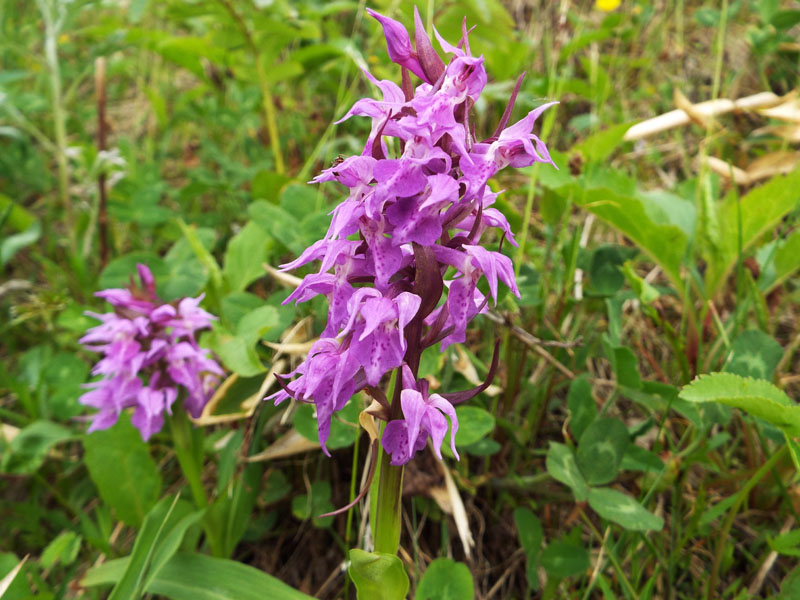
“Haku-san Chidori”, the Alpine Swamp Orchid ~ dactylorhiza aristata . There are many alpine plants which have “Hakusan” in their name because they were first discovered and named along the older hiking trails leading to Hakusan Shrine in Gifu Prefecture; however, the same plants can be found on many mountains throughout Japan – including Rishiri-Fuji. ~ photo by Eiji Nishiya
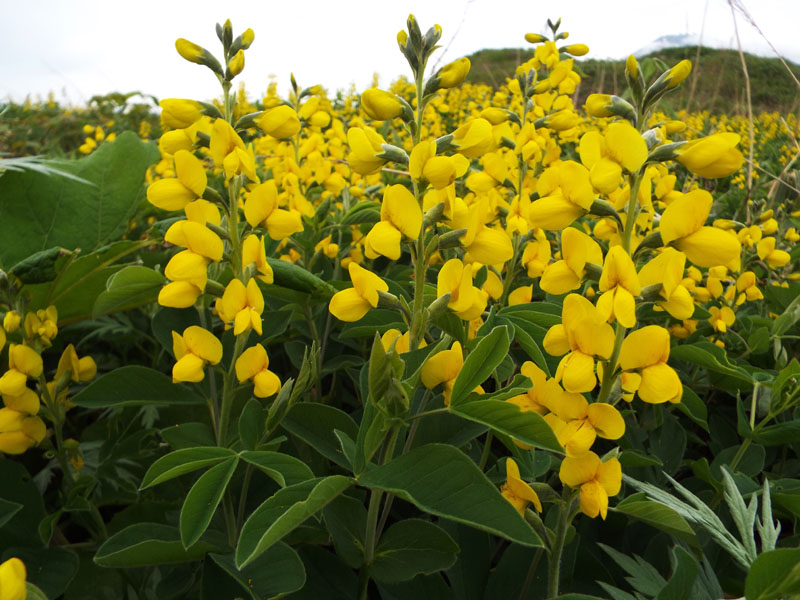
Sendai Hagi – Japanese ‘Bush Clover’ (also known as Russian False Yellow Lupine) ~ Thermopsis lupinoides. In China the aerial parts and seeds are used as a crude drug as anti-inflammatory, expectorant, and emetic (a medicine or potion that makes you vomit; the Chinese name for medicinal use is ye jue ming). ~ photo by Eiji Nishiya
Posted in FOM Japan, Gates Ajar, Home | Comments Off on Early Summer Flowers of Rishiri
Sunday, June 22nd, 2014
Japanese teens learn about famous resident’s birthplace ~ By Edward Stratton, The DAILY ASTORIAN, Oct. 9, 2013
Ranald MacDonald, an Astoria native born at Fort George, landed on the Japanese island of Rishiri 165 years ago, and became the first English teacher in Japan. During October 2013, two students from Rishiri Public High School visited Astoria to improve their English skills and understanding of MacDonald’s birthplace. They departed for other locations in Washington before heading back to Japan.
Tatsuya Koujiya and Yuuki Komatsu, both 17, arrived in Astoria Oct. 6 with their principal, Hiroyuki Tsukamoto.
“The purpose of it is to encourage the students to learn English and nurture international-minded youth,” said Masaru Yatabe, chairman of the 25-year-old Friends of MacDonald and host and interpreter for the students during their visit to the U.S.
The Japanese newspaper Daily Souya reported Dec. 11 that the communities on Rishiri Island, namely Rishiri and Rishirifuji, established the MacDonald’s Encouragement Study Fund, encouraging students to learn English. One or two top students will be chosen each year from their English-language class and travel to Oregon and Washington to experience American life and encourage their English-language skills.
Tatsuya and Yuuki are the first recipients of the fund. They passed a standardized English test, wrote theses in Japanese about what their goals were during the visit and were interviewed by their principal, vice principal and English teacher.
Tatsuya, a senior at Rishiri, said he was hurt and unable to play for his school’s badminton team. So he looked into the study abroad fund and thought it would contribute to his future. Yuuki, who had never left Japan before, works part time at a restaurant and wants to improve his language skills for when he helps foreign customers.
Yuuki and Tatsuya moved in with the families of 15-year-old sophomores Clay Williams and Ben Williams, respectively (they are not related). They’ve been shadowing their hosts in class, visiting local tourist attractions and the MacDonald monument near Fort George. They also attended a 15-6 AHS junior varsity football victory in Tillamook.
Rishiri’s high school has 96 students compared with AHS’ more than 600. Yuuki said at first it was overwhelming, but that over time Ben and Clay have introduced him and Tatsuya to other students, and that they’ve been enjoying the last couple of days despite the language barrier.
“Anyone going to a new place would feel kind of … nervous and quiet,” said Ben Williams, who along with Clay Williams said their Japanese peers are particularly polite. “The language sometimes is a little bit of a problem.”
The relative freedom and individuality of AHS was something new to Tatsuya and Yuuki, who said their high school environment in Rishiri is much more controlled with a focus on group action.
“Sometimes we feel like we lack the structure, so it’s the meeting of the minds,” said AHS Principal Lynn Jackson about the differences.
The two students and their principal left for Spokane, Wash., this morning, bound ultimately for Republic, Wash., where MacDonald died in 1894. Yatabe said they’ll shadow more students at Curlew High School in northeastern Washington, pay respects at MacDonald’s graveside and visit Mukogawa Women’s University in Spokane, Wash. Then they will spend two days getting back to Rishiri, traveling through Spokane, Seattle, Tokyo, Sapporo, Japan, and finally home.
***
Posted in FOM Japan, Gates Ajar, Home | 1 Comment »
Friday, January 31st, 2014
2014 is already approaching February! I sincerely hope the beginning of everyone’s year has been smooth and that you all are in good health and that the year ahead will be everything you want it to be.
2014年ももうじき2月を迎えようとしておりますが、FOM会員の皆様にとり、健康でスムーズな年初めであった事、そして残り11ヶ月余が充実した時になる事・・・を念じて居ります。
At 3:00 p.m. on October 6th, 2013 three Japanese – along with several Americans – were at Fort Astoria (Ft. George) National Historic Site. The three were gazing at the stone monument entitled “The Birth Place of Ranald MacDonald”. The scene was not unusual, but it was quite historic! 時は2013年10月6日午後3時、数人のアメリカ人に混ざって3人の日本人がFort Astoria 史跡公園を訪れていた。3人はその一遇に建つ「マクドナルド生誕の地」と刻まれた石碑に見入っていた。それ自体珍しい光景ではなかったが、それは大変歴史的な出来事であった。
Ranald MacDonald was born at Fort Astoria (Fort George) on February 3, 1824 the son of Archibald McDonald and Princess Sunday, a daughter of Chinook Indian Chief. In 1848, Ranald – a grown to be a strong 24 year-old sailor – succeeded in landing on an a small island in the Sea of Japan off northern- most Hokkaido. At that time it was generally regarded as an unattainable venture to enter Japan; however, with the careful planning of a “faked shipwreck”, Ranald was saved by Ainu people and the result was a successful landing onto Japanese soil. Soon after that, Ranald was arrested as an unlawful intruder and was transported to Nagasaki under “house arrest” at Daihian, where the translators of Dejima were taught English by Ranald. That is why Ranald is regarded as the first Native English Teacher in Japan. ラナルド・マクドナルドは、スコットランド人アーチボルド・マクドナルドを父に、チヌーク族族長の娘、プリンセス・サンデーを母とし、ここFort Astoria (Fort George) で1824年2月3日に産声をあげた。そして1848年、24歳のたくましい船員に成長したラナルドは北海道北端の日本海に浮かぶ利尻島への単独上陸に成功した。当時鎖国令を敷いていた日本への入国は無謀・・・と思われていたが、ラナルドは緻密な計画に従い遭難を偽装、かけつけたアイヌに救助され、結果的に目的を果たしたのだった。しかし、その後不法入国者・・・として幕府に捕えられ長崎へ護送された後、座敷牢”大悲庵”に幽閉されたが、そこで出島の通詞達に英語を教えた事が今日マクドナルドを「日本で最初のネイティブ英語教師」と位置付けている所以である。
The three Japanese at Fort Astoria were two students, Yuuki Komatsu and Tatsuya Koujiya of Rishiri High School and their principle, Mr. Hiroyuki Tsukamoto. The three had arrived at Portland International Airport a day earlier, October 5, 2013. So it was that 165 years since Ranald landed on Rishiri Island, three people from Rishiri came to visit Astoria, the birth place of Ranald MacDonald. There are only two towns on Rishiri Island: Rishiri-cho and Rishirifuji-cho. In December 2012 the citizens, the businesses and other groups in both towns got together and established “A Support Group for MacDonald Scholarship Funds” in order to support the only high school on the Island, Rishiri Senior High School. The objective is to send a few students annually to the US, in particular, to Oregon and Washington states, where Ranald had close ties – and thus encourage students to study English and assist students to acquire an “International mind and etiquette”. The next few pages are copies of newspaper articles, photos and the comments by Yuuki-kun and Tatsuya-kun from Rishiri Senior High School:
Fort Astoria に居た3人の日本人は北海道利尻高校から前日(10月5日)ポートランド国際空港に到着した留学生の小松祐希君及び糀屋達也君と付添いの塚本宏之校長先生であった。オレゴニアン、ラナルド・マクドナルドが利尻島に上陸して以来、実に165年間を経た2013年に利尻島からの3人はラナルドの生誕地、アストリアへやって来たのであった。利尻島内には利尻町及び利尻富士町という2つの町が在るが両町の町民や企業、団体が島の将来の為協力し同島内唯一の利尻高校を支援し元気付けようと2012年12月に「マクドナルド奨学基金支援の会」を立ち上げた。その趣旨は毎年何人かの利尻高校生を米国(特にマクドナルドゆかりの地、オレゴンとワシントン州)へ短期留学させ、生徒達の英語学習欲を促し、同時に国際感覚養成に役立てるというものだった。 以下、小松君及び糀屋君のオレゴン及びワシントン州への第1回留学に関する新聞記事や写真、両君の感想等を掲載させて頂く:
ご報告: 2013年5月11日のFOM年次総会席上ご承認頂きました「FOMよりマクドナルド奨学基金 支援の会への寄付10口分として¥50,000」を実行致しました。
Report: We have donated 50,000 yen to The MacDonald Scholarship Fund in Rishiri Island from FOM General Funds per approval during the annual luncheon meeting in Astoria on May 11, 2013.
FOM Chairman 谷田部 勝/Masaru “Mas” Yatabe
* * * * *
朝日新聞 — Asahi Shimbun
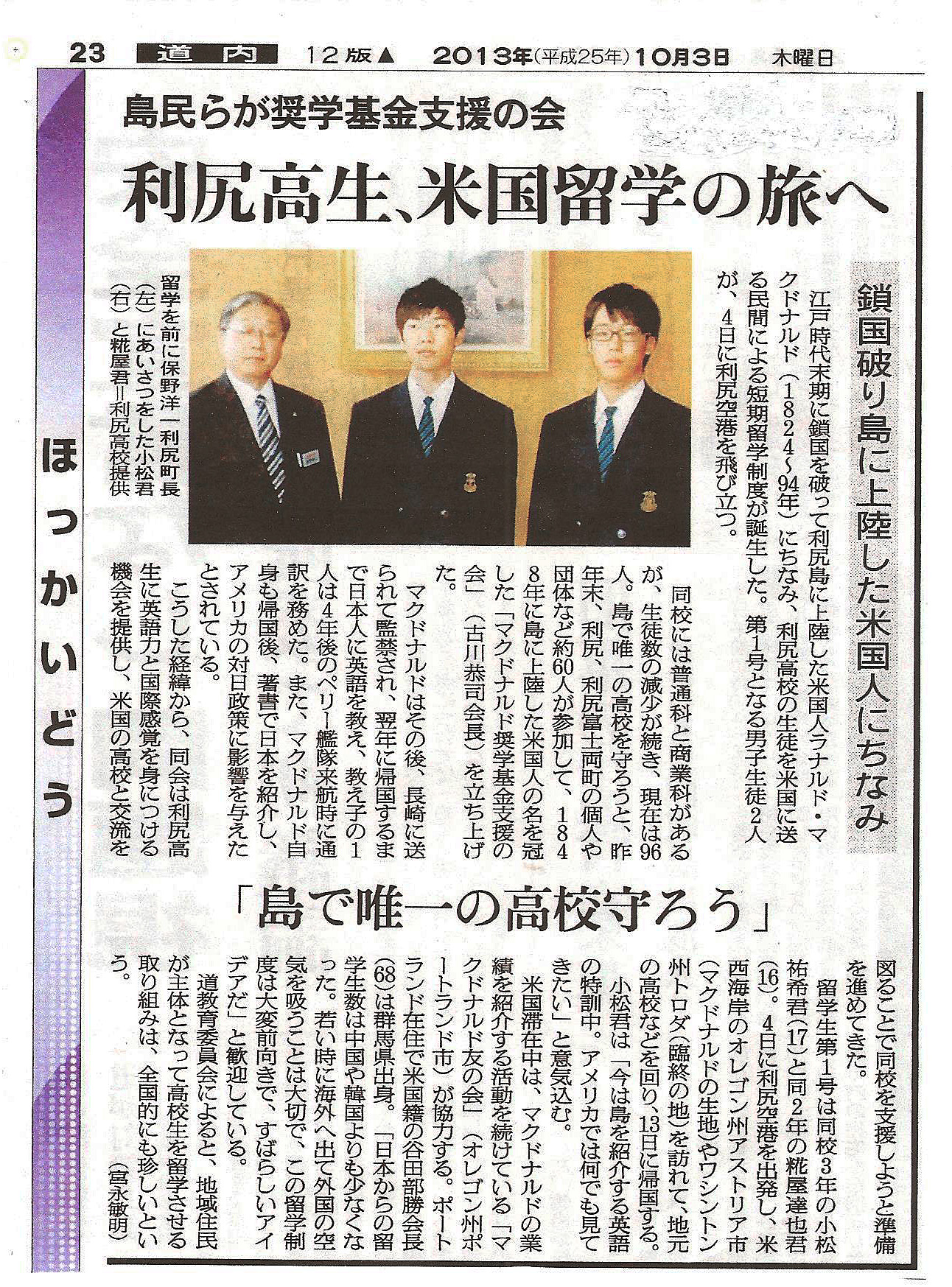
Our Overall Impressions
3年 小松 祐希/Yuuki Komatsu, Senior
僕は今回、アメリカ研修留学に行って本当によかったと思っています。 それは、たくさんの人に出会い、たくさんの事を学び、広く視野を広げることが出来たからです。ですが、1つ後悔をした事が在ります。それは「もっと英語の勉強をしておけばよかった」ということです。 アメリカでの生活の中で1番困ったのが「英会話」でした。あまり英語が話せなくても楽しく8日間をすごすことができましたが、ちゃんと英語が話せればもっともっと楽しく充実した8日間になったのかな。と思うととても悔しく思いました。来年度からもこの事業が続いて行くという事なので、次回の留学生には僕のように後悔をせず心からアメリカでの生活を楽しんできてもらいたいです。なので、学校での英語勉強の徹底をした方がいいと思いました。このような体験ができたのもマクドナルド奨学金支援の会の方々や利尻町、利尻富士町両町のご支援ご協力があったからです。今回学んだことを残りの高校生活、そして卒業後の学生生活に活かしていこうと思います。この度は、本当にありがとうございました。
I am truly glad that I went to America to study this time. It enabled me to meet many people, learn many things and gave me a broader perspective. However, I do have one regret: I should have studied English harder. The most troublesome thing for me was English conversation. It made me feel sorry when I realized the 8 days would have been a lot more enjoyable if I had had better command of English – even though those 8 days were fun days. I understand that this program will continue on to next year and beyond; I hope future participants will enjoy the experience fully and without regret. Therefore, it will be a good idea to make sure the student(s) study English seriously and with diligence. I was able to have this valuable experience because of the assistance and cooperation of the people of ‘MacDonald Scholarship Fund Support Group’ and the Towns of Rishiri and Rishirifuji. I intend to apply and utilize what I learned to the rest of my High School life and my life after graduation. Thank you very much.
2年 糀屋 達也/Tatsuya Koujiya, Junior
今回の留学研修は自分にとってとてもためになり研修となりました。初めてアメリカに行き、たくさんの驚きがありました。特に僕が印象に残っているのは、むこうの学校に行き、生徒と交流をした事です。言葉がなかなか通じない中、身振り手振りでコミュニケーションをとり、一緒に授業を受けたことが一番楽しかったです。又、ホームステイなどでは、一人で外国人の中に入っていって何日間か過ごしました。そのなかで困ったときにも自分でしっかり対処できたことにより、少し自信を持つことができました。今回の研修で日本とアメリカの文化の違いを体験したことで、日本にいただけでは感じることのできなかった世界観や視野をこれからの進路にいかしていきたいと思います。最後になりましたが、利尻町、利尻富士町のみなさん、そしてマクドナルド基金のみなさんには、ご支援いただき、このような機会を作っていただいたことに深く感謝します。来年ももし行く機会があれば、また行ってみたいです。
Studying abroad was a very good experience for me and visiting America for the first time gave me many surprises. I will always remember going to school in America and exchanging ideas with the students I met. The most enjoyable thing was to go to class together (with American students) even though we had language difficulty and had to depend on our hands and body gestures a lot for communication. I was alone among foreigners for a few days during the home stay, and I gained confidence in myself when I was able to work out a problem by myself. In the future I hope I can apply the worldwide perspective which I gained through experiencing the cultural differences between Japan and America during the study tour, experiences I could not have enjoyed had I stayed in Japan. Last, but not least, I would like to express my deep appreciation to the people of the Towns of Rishiri and Rishirifuji and the members of ‘MacDonald Scholarship’ funds. If I could go again next year, I would love to.
Posted in Gates Ajar, Home | Comments Off on Happy 2014 A Little Bit Late
|
 |
|







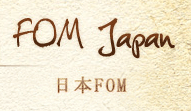
 「マクドナルド上陸記念碑の建立を祝ってラナルド・マクドナルド利尻島上陸記念碑の建立に際し、私ども日本マクドナルド友の会から、心からお祝いを申し上げます。野塚岬の丘の上に立つと、はるか150年も昔、マクドナルドが草履をはき、二人のアイヌに手を引かれて、おぼつかない足どりで浜辺から上がってくる姿が眼に浮かびます。厳しい鎖国令下にある日本に潜入するため、慎重で大胆な冒険家マクドナルドが選んだ戦略は偽装漂流と、島の人びとの温情にすがることでありました。それは美事に成功し、野塚の番小屋では、タンガロと誤記された番人多治郎との暖かい友情まで生まれました。同じ平地に立って一対一で対等に向き合えば、いつの時代でも、どこででも、暖かい人間同士の交流が成立するのだ、という事をマクドナルドは身をもって示してくれたのです。10年ばかり前に、アメリカ側にフレンズ・オブ・マクドナルドが結成され、アストリアの丘の中腹にある生誕地に、マクドナルド顕彰碑が建立されました。ここ野塚の上陸記念碑とアストリアの顕彰碑は、太平洋を挟んではるかに向き合い、初めは言葉も分からない人間同士が、相互に相手を信頼し合えば、深い友情の絆で結ばれうるという事を、訪れる人びとに語り続ける事でありましょう。ひと言つけ加えたいと思います。それは、この記念碑の建立を誰にもまして悦んで下さるはずの二人の方を、最近相ついで失ってしまった事です。一人はフレンズ・オブ・マクドナルドの会長冨田正勝氏であり、もう一人は日本マクドナルド友の会の発展に尽くされた高橋正樹氏であります。お二人の御冥福を祈りたいと思います。1996年10月23日 日本マクドナルド友の会 富田虎男」
「マクドナルド上陸記念碑の建立を祝ってラナルド・マクドナルド利尻島上陸記念碑の建立に際し、私ども日本マクドナルド友の会から、心からお祝いを申し上げます。野塚岬の丘の上に立つと、はるか150年も昔、マクドナルドが草履をはき、二人のアイヌに手を引かれて、おぼつかない足どりで浜辺から上がってくる姿が眼に浮かびます。厳しい鎖国令下にある日本に潜入するため、慎重で大胆な冒険家マクドナルドが選んだ戦略は偽装漂流と、島の人びとの温情にすがることでありました。それは美事に成功し、野塚の番小屋では、タンガロと誤記された番人多治郎との暖かい友情まで生まれました。同じ平地に立って一対一で対等に向き合えば、いつの時代でも、どこででも、暖かい人間同士の交流が成立するのだ、という事をマクドナルドは身をもって示してくれたのです。10年ばかり前に、アメリカ側にフレンズ・オブ・マクドナルドが結成され、アストリアの丘の中腹にある生誕地に、マクドナルド顕彰碑が建立されました。ここ野塚の上陸記念碑とアストリアの顕彰碑は、太平洋を挟んではるかに向き合い、初めは言葉も分からない人間同士が、相互に相手を信頼し合えば、深い友情の絆で結ばれうるという事を、訪れる人びとに語り続ける事でありましょう。ひと言つけ加えたいと思います。それは、この記念碑の建立を誰にもまして悦んで下さるはずの二人の方を、最近相ついで失ってしまった事です。一人はフレンズ・オブ・マクドナルドの会長冨田正勝氏であり、もう一人は日本マクドナルド友の会の発展に尽くされた高橋正樹氏であります。お二人の御冥福を祈りたいと思います。1996年10月23日 日本マクドナルド友の会 富田虎男」 as very much like you and me, operating in a highly unbalanced world. And it seems to me that we are all living again in a highly unbalanced world. Just as Ranald MacDonald cannot be understood without understanding the world he lived in, so, too, are we unable to understand ourselves without understanding the world that surrounds us. FOM NL therefore seeks to recognize and encourage the work of people who can help us understand what is happening. I like to think that Ranald MacDonald would be very happy with our goal, and I hope you agree.
as very much like you and me, operating in a highly unbalanced world. And it seems to me that we are all living again in a highly unbalanced world. Just as Ranald MacDonald cannot be understood without understanding the world he lived in, so, too, are we unable to understand ourselves without understanding the world that surrounds us. FOM NL therefore seeks to recognize and encourage the work of people who can help us understand what is happening. I like to think that Ranald MacDonald would be very happy with our goal, and I hope you agree.








